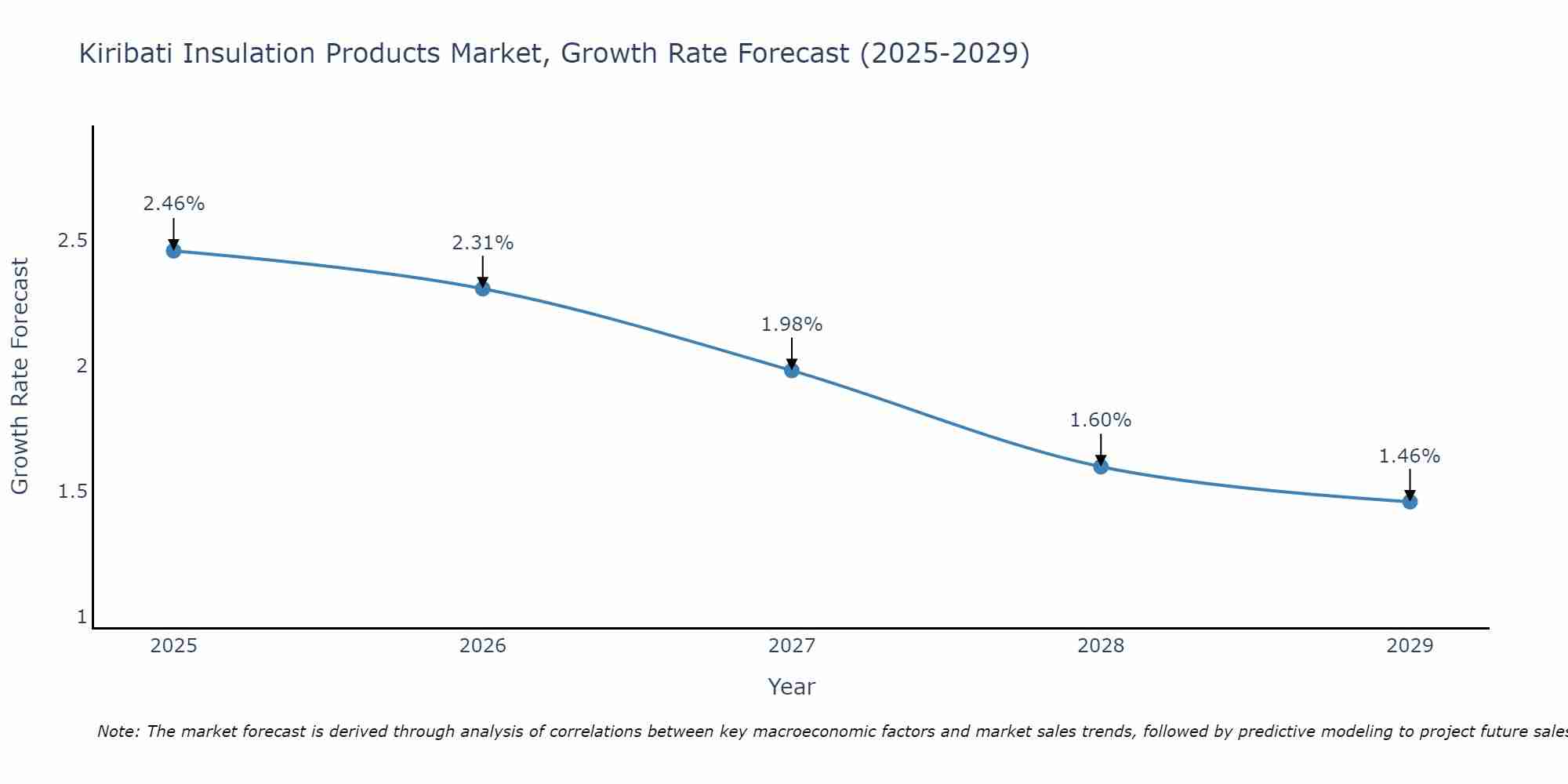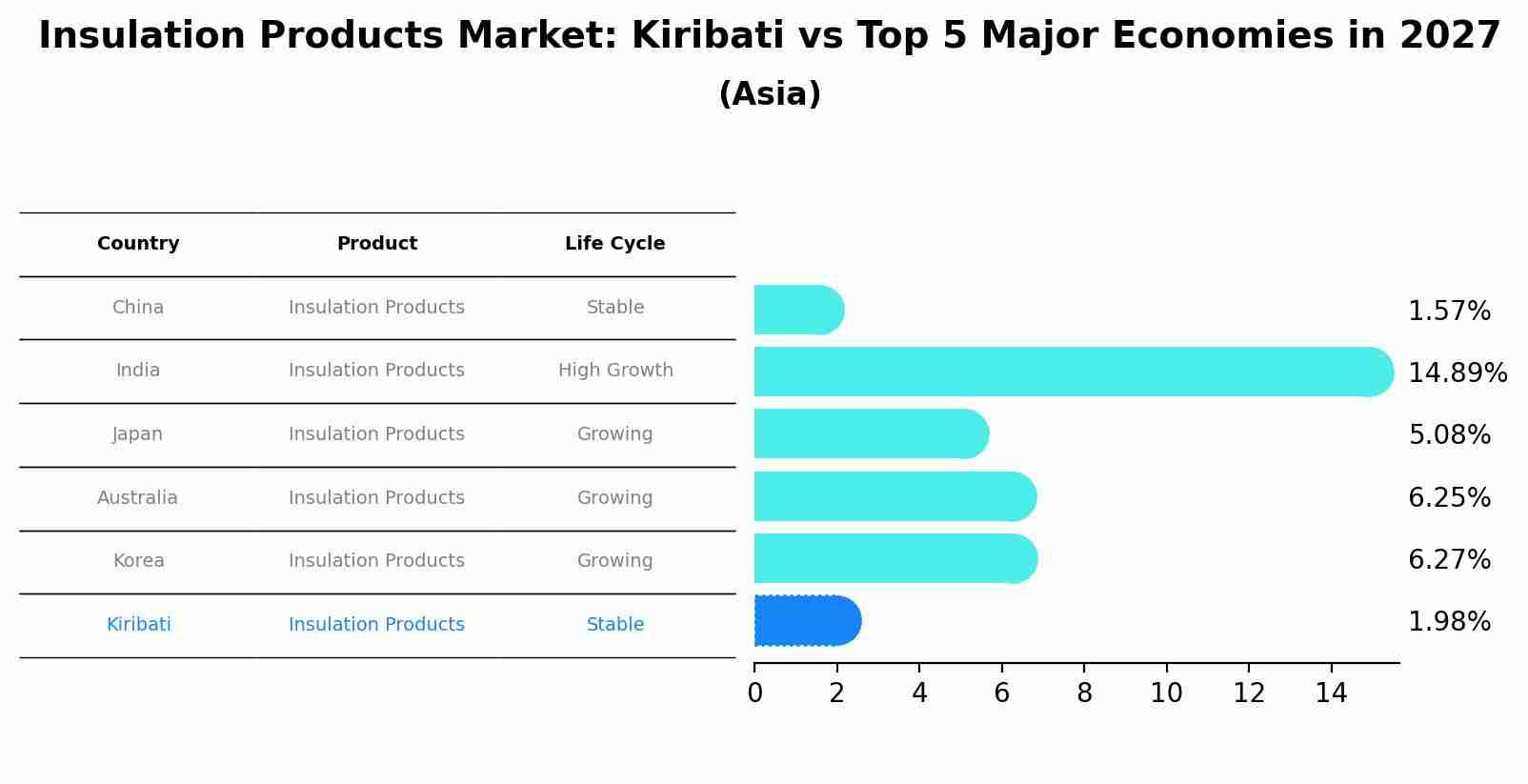Kiribati Insulation Products Market (2025-2031) | Companies, Industry, Growth, Forecast, Analysis, Outlook, Size, Trends, Revenue, Value, Segmentation & Share
| Product Code: ETC5126004 | Publication Date: Nov 2023 | Updated Date: Apr 2025 | Product Type: Market Research Report | |
| Publisher: 6Wresearch | Author: Shubham Padhi | No. of Pages: 60 | No. of Figures: 30 | No. of Tables: 5 |
Kiribati Insulation Products Market Size Growth Rate
The Kiribati Insulation Products Market could see a tapering of growth rates over 2025 to 2029. Beginning strongly at 2.46% in 2025, growth softens to 1.46% in 2029.

Insulation Products Market: Kiribati vs Top 5 Major Economies in 2027 (Asia)
The Insulation Products market in Kiribati is projected to grow at a stable growth rate of 1.98% by 2027, highlighting the country's increasing focus on advanced technologies within the Asia region, where China holds the dominant position, followed closely by India, Japan, Australia and South Korea, shaping overall regional demand.

Key Highlights of the Report:
- Kiribati Insulation Products Market Outlook
- Market Size of Kiribati Insulation Products Market, 2024
- Forecast of Kiribati Insulation Products Market, 2031
- Historical Data and Forecast of Kiribati Insulation Products Revenues & Volume for the Period 2021-2031
- Kiribati Insulation Products Market Trend Evolution
- Kiribati Insulation Products Market Drivers and Challenges
- Kiribati Insulation Products Price Trends
- Kiribati Insulation Products Porter`s Five Forces
- Kiribati Insulation Products Industry Life Cycle
- Historical Data and Forecast of Kiribati Insulation Products Market Revenues & Volume By Insulation Type for the Period 2021-2031
- Historical Data and Forecast of Kiribati Insulation Products Market Revenues & Volume By Thermal for the Period 2021-2031
- Historical Data and Forecast of Kiribati Insulation Products Market Revenues & Volume By Acoustic & others for the Period 2021-2031
- Historical Data and Forecast of Kiribati Insulation Products Market Revenues & Volume By Material Type for the Period 2021-2031
- Historical Data and Forecast of Kiribati Insulation Products Market Revenues & Volume By Mineral Wool for the Period 2021-2031
- Historical Data and Forecast of Kiribati Insulation Products Market Revenues & Volume By Fiberglass for the Period 2021-2031
- Historical Data and Forecast of Kiribati Insulation Products Market Revenues & Volume By Stone wool for the Period 2021-2031
- Historical Data and Forecast of Kiribati Insulation Products Market Revenues & Volume By Polyurethane Foam (PUF) for the Period 2021-2031
- Historical Data and Forecast of Kiribati Insulation Products Market Revenues & Volume By Flexible Elastomeric Foam (FEF) for the Period 2021-2031
- Historical Data and Forecast of Kiribati Insulation Products Market Revenues & Volume By Other Insulations for the Period 2021-2031
- Historical Data and Forecast of Kiribati Insulation Products Market Revenues & Volume By End Use for the Period 2021-2031
- Historical Data and Forecast of Kiribati Insulation Products Market Revenues & Volume By Building & Construction for the Period 2021-2031
- Historical Data and Forecast of Kiribati Insulation Products Market Revenues & Volume By Industrial for the Period 2021-2031
- Historical Data and Forecast of Kiribati Insulation Products Market Revenues & Volume By Transportation for the Period 2021-2031
- Historical Data and Forecast of Kiribati Insulation Products Market Revenues & Volume By Consumer for the Period 2021-2031
- Kiribati Insulation Products Import Export Trade Statistics
- Market Opportunity Assessment By Insulation Type
- Market Opportunity Assessment By Material Type
- Market Opportunity Assessment By End Use
- Kiribati Insulation Products Top Companies Market Share
- Kiribati Insulation Products Competitive Benchmarking By Technical and Operational Parameters
- Kiribati Insulation Products Company Profiles
- Kiribati Insulation Products Key Strategic Recommendations
Frequently Asked Questions About the Market Study (FAQs):
1 Executive Summary |
2 Introduction |
2.1 Key Highlights of the Report |
2.2 Report Description |
2.3 Market Scope & Segmentation |
2.4 Research Methodology |
2.5 Assumptions |
3 Kiribati Insulation Products Market Overview |
3.1 Kiribati Country Macro Economic Indicators |
3.2 Kiribati Insulation Products Market Revenues & Volume, 2021 & 2031F |
3.3 Kiribati Insulation Products Market - Industry Life Cycle |
3.4 Kiribati Insulation Products Market - Porter's Five Forces |
3.5 Kiribati Insulation Products Market Revenues & Volume Share, By Insulation Type, 2021 & 2031F |
3.6 Kiribati Insulation Products Market Revenues & Volume Share, By Material Type, 2021 & 2031F |
3.7 Kiribati Insulation Products Market Revenues & Volume Share, By End Use, 2021 & 2031F |
4 Kiribati Insulation Products Market Dynamics |
4.1 Impact Analysis |
4.2 Market Drivers |
4.3 Market Restraints |
5 Kiribati Insulation Products Market Trends |
6 Kiribati Insulation Products Market Segmentations |
6.1 Kiribati Insulation Products Market, By Insulation Type |
6.1.1 Overview and Analysis |
6.1.2 Kiribati Insulation Products Market Revenues & Volume, By Thermal, 2021-2031F |
6.1.3 Kiribati Insulation Products Market Revenues & Volume, By Acoustic & others, 2021-2031F |
6.2 Kiribati Insulation Products Market, By Material Type |
6.2.1 Overview and Analysis |
6.2.2 Kiribati Insulation Products Market Revenues & Volume, By Mineral Wool, 2021-2031F |
6.2.3 Kiribati Insulation Products Market Revenues & Volume, By Fiberglass, 2021-2031F |
6.2.4 Kiribati Insulation Products Market Revenues & Volume, By Stone wool, 2021-2031F |
6.2.5 Kiribati Insulation Products Market Revenues & Volume, By Polyurethane Foam (PUF), 2021-2031F |
6.2.6 Kiribati Insulation Products Market Revenues & Volume, By Flexible Elastomeric Foam (FEF), 2021-2031F |
6.2.7 Kiribati Insulation Products Market Revenues & Volume, By Other Insulations, 2021-2031F |
6.3 Kiribati Insulation Products Market, By End Use |
6.3.1 Overview and Analysis |
6.3.2 Kiribati Insulation Products Market Revenues & Volume, By Building & Construction, 2021-2031F |
6.3.3 Kiribati Insulation Products Market Revenues & Volume, By Industrial, 2021-2031F |
6.3.4 Kiribati Insulation Products Market Revenues & Volume, By Transportation, 2021-2031F |
6.3.5 Kiribati Insulation Products Market Revenues & Volume, By Consumer, 2021-2031F |
7 Kiribati Insulation Products Market Import-Export Trade Statistics |
7.1 Kiribati Insulation Products Market Export to Major Countries |
7.2 Kiribati Insulation Products Market Imports from Major Countries |
8 Kiribati Insulation Products Market Key Performance Indicators |
9 Kiribati Insulation Products Market - Opportunity Assessment |
9.1 Kiribati Insulation Products Market Opportunity Assessment, By Insulation Type, 2021 & 2031F |
9.2 Kiribati Insulation Products Market Opportunity Assessment, By Material Type, 2021 & 2031F |
9.3 Kiribati Insulation Products Market Opportunity Assessment, By End Use, 2021 & 2031F |
10 Kiribati Insulation Products Market - Competitive Landscape |
10.1 Kiribati Insulation Products Market Revenue Share, By Companies, 2024 |
10.2 Kiribati Insulation Products Market Competitive Benchmarking, By Operating and Technical Parameters |
11 Company Profiles |
12 Recommendations | 13 Disclaimer |
- Single User License$ 1,995
- Department License$ 2,400
- Site License$ 3,120
- Global License$ 3,795
Search
Thought Leadership and Analyst Meet
Our Clients
Related Reports
- Canada Oil and Gas Market (2026-2032) | Share, Segmentation, Value, Industry, Trends, Forecast, Analysis, Size & Revenue, Growth, Competitive Landscape, Outlook, Companies
- Germany Breakfast Food Market (2026-2032) | Industry, Share, Growth, Size, Companies, Value, Analysis, Revenue, Trends, Forecast & Outlook
- Australia Briquette Market (2025-2031) | Growth, Size, Revenue, Forecast, Analysis, Trends, Value, Share, Industry & Companies
- Vietnam System Integrator Market (2025-2031) | Size, Companies, Analysis, Industry, Value, Forecast, Growth, Trends, Revenue & Share
- ASEAN and Thailand Brain Health Supplements Market (2025-2031) | Strategy, Consumer Insights, Analysis, Investment Trends, Opportunities, Growth, Size, Share, Industry, Revenue, Segments, Value, Segmentation, Supply, Forecast, Restraints, Outlook, Competition, Drivers, Trends, Demand, Pricing Analysis, Competitive, Strategic Insights, Companies, Challenges
- ASEAN Bearings Market (2025-2031) | Strategy, Consumer Insights, Analysis, Investment Trends, Opportunities, Growth, Size, Share, Industry, Revenue, Segments, Value, Segmentation, Supply, Forecast, Restraints, Outlook, Competition, Drivers, Trends, Demand, Pricing Analysis, Competitive, Strategic Insights, Companies, Challenges
- Europe Flooring Market (2025-2031) | Outlook, Share, Industry, Trends, Forecast, Companies, Revenue, Size, Analysis, Growth & Value
- Saudi Arabia Manlift Market (2025-2031) | Outlook, Size, Growth, Trends, Companies, Industry, Revenue, Value, Share, Forecast & Analysis
- Uganda Excavator, Crane, and Wheel Loaders Market (2025-2031) | Strategy, Consumer Insights, Analysis, Investment Trends, Opportunities, Growth, Size, Share, Industry, Revenue, Segments, Value, Segmentation, Supply, Forecast, Restraints, Outlook, Competition, Drivers, Trends, Demand, Pricing Analysis, Competitive, Strategic Insights, Companies, Challenges
- Rwanda Excavator, Crane, and Wheel Loaders Market (2025-2031) | Strategy, Consumer Insights, Analysis, Investment Trends, Opportunities, Growth, Size, Share, Industry, Revenue, Segments, Value, Segmentation, Supply, Forecast, Restraints, Outlook, Competition, Drivers, Trends, Demand, Pricing Analysis, Competitive, Strategic Insights, Companies, Challenges
Industry Events and Analyst Meet
Whitepaper
- Middle East & Africa Commercial Security Market Click here to view more.
- Middle East & Africa Fire Safety Systems & Equipment Market Click here to view more.
- GCC Drone Market Click here to view more.
- Middle East Lighting Fixture Market Click here to view more.
- GCC Physical & Perimeter Security Market Click here to view more.
6WResearch In News
- Doha a strategic location for EV manufacturing hub: IPA Qatar
- Demand for luxury TVs surging in the GCC, says Samsung
- Empowering Growth: The Thriving Journey of Bangladesh’s Cable Industry
- Demand for luxury TVs surging in the GCC, says Samsung
- Video call with a traditional healer? Once unthinkable, it’s now common in South Africa
- Intelligent Buildings To Smooth GCC’s Path To Net Zero


















